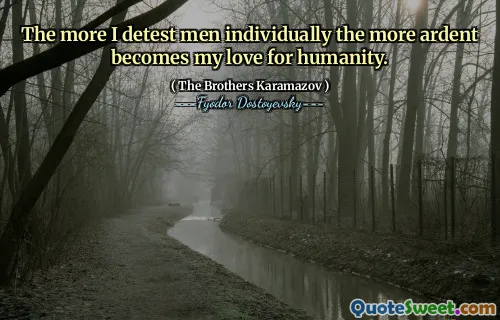
The Brothers Karamazov is a joyful book.
Fyodor Dostoyevsky's 'The Brothers Karamazov' is often regarded as a profound exploration of faith, morality, and human nature. The assertion that it is a joyful book might seem paradoxical at first glance, given the book's intense emotional struggles, moral dilemmas, and philosophical debates. However, within its pages, there exists a richness of human experience that can be comfortingly uplifting. The novel intricately examines the depths of human soulfulness, highlighting moments of love, forgiveness, and hope amidst despair and chaos. It encourages readers to confront uncomfortable truths about themselves and society while ultimately suggesting that understanding and compassion can serve as guiding lights through darkness.
The joy in the book can be interpreted as the profound sense of insight and catharsis that Dostoyevsky provides. It invites us to reflect on the moral choices we face, the importance of faith and humility, and the possibility of redemption. Moreover, the depth of the characters — flawed yet striving for goodness — mirrors the potential for joy within the human condition when we acknowledge our imperfections and seek truth. In this perspective, the book becomes a celebration of human resilience and moral inquiry, making it a source of inspiration and joy to many readers who find solace and motivation in its philosophical reflections and complex characters.
Overall, describing it as joyful aligns with the idea that profound art often reveals not only the complexity of life's suffering but also the beauty and hope that can arise from understanding that suffering as part of the human journey.











